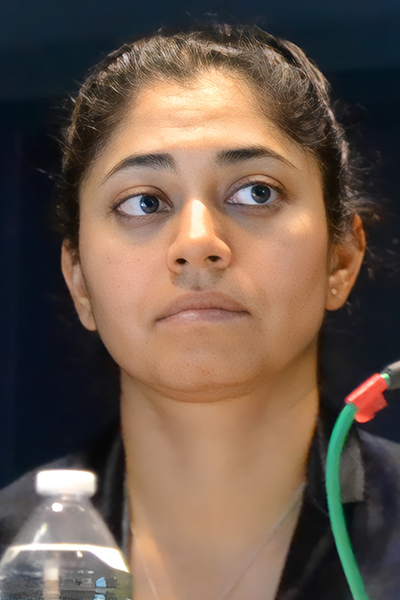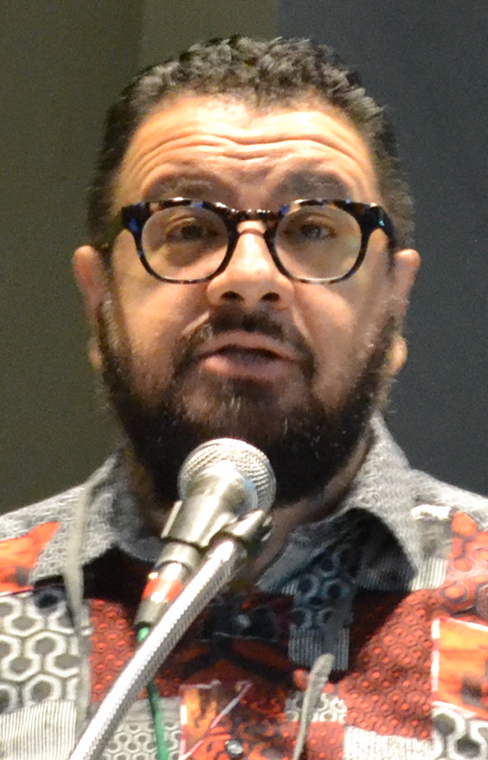Over the last 10 months, unprecedented policy initiatives have had a substantial impact on health care in the United States, including the practice of pulmonary, critical care, and sleep medicine (PCCSM).
Panelists discussed how these changes are affecting health care workplaces and vulnerable patient populations during the CHEST 2025 session Federal Mandates and Impact on PCCSM Health on Monday, October 20, in Chicago.

Session Chair Debasree Banerjee, MD, FCCP, summarized some of the administration’s health care mandates and proposed policy changes, including NIH funding caps, cuts to smoking cessation care initiatives, $100,000 fees for H-1B visas (a visa often used by international medical workers coming to the United States), campaigns alleging bias in reputable scientific journals, and nonscience-based attacks on vaccine efficacy and aspects of standard maternal health care.
Dr. Banerjee, Associate Professor of Medicine at Brown University, specifically pointed to the ban on federal funding for programs with diversity, equity, and inclusion (DEI) initiatives. Some graduate medical accreditation groups have already dropped DEI-specific requirements, she noted, and she also anticipates a drop-off in underrepresented groups applying to medical programs and the loss of a potential population of talented and needed medical providers.
“This ban on DEI has resulted in several things, including the dismantling of the health care pipeline, policies that directly impact patient care, and it has certainly fueled distrust in medicine and science,” she said. “Together, I believe this will result in a health care crisis.”
The American Medical Association has noted that 25% of physicians in the United States are international graduates and the new visa policy could limit these qualified specialists, contributing to an expected physician shortage of 86,000 by 2036, according to a report by the Association of American Medical Colleges.
“This will disproportionately affect red states, the areas with more rural communities and less physician density,” Dr. Banerjee said of the physician shortfall.
Recalling historical precedents, Dr. Banerjee noted that attacks on science, particularly those focused on race, are not new to global politics.
“We have seen this before, the explosive mixture of political rhetoric and anti-science, or even violence, in the past,” she said. “I believe we are here, and we are at an impasse where we need to make some change.”
Dr. Banerjee highlighted a particular need for the medical community to defend the efficacy and safety of vaccines against increasing attacks.
“Thankfully, individual states and individuals in seats of power have been creative in combating this,” Dr. Banerjee said, referencing specific state initiatives to protect immunizations. “I am glad that we are starting to combat some of these federal mandates in order to protect our communities.”

Session Co-Chair Adan (Adam) Mora Jr, MD, FCCP, Associate Professor in the Department of Internal Medicine at UT Southwestern Medical Center, examined how federal policies were impacting transgender and undocumented populations in the United States.
Dr. Mora cited a roll call of incidents in which individuals were either denied or afraid to seek emergency medical care because of recent policy changes. The transgender population was vulnerable to issues such as insurance coverage loss and hormone treatment denial prior to 2025, Dr. Mora explained, but the recent political and cultural climate has the potential for a cascade of negative health impacts. For example, new policies dropping enforcement of protection from gender identity discrimination in housing can leave patients with unstable shelter and expose them to greater health and safety risks.
Both Drs. Banerjee and Mora suggested that a full and robust response to the federal changes will require more than a return to some idealized 2024 status quo but rather a cultivation of public trust that acknowledges both scientific values and longstanding systemic deficiencies, particularly in relation to policies targeting underrepresented groups.
“This is really a call to action,” Dr. Mora said. “What the government is not recognizing right now is that what they are doing is not just affecting who they think they are targeting but also the people they are claiming to fight for.”

Call for Topics Is Open
Feeling inspired by all the great sessions in Chicago? Help shape the curriculum for CHEST 2026, October 18 to 21 in Phoenix, by submitting topic ideas from areas you’re passionate about, topics affecting your practice, or new technologies you’d like to learn more about. The submission deadline is Tuesday, December 2, at 2 pm CT.


